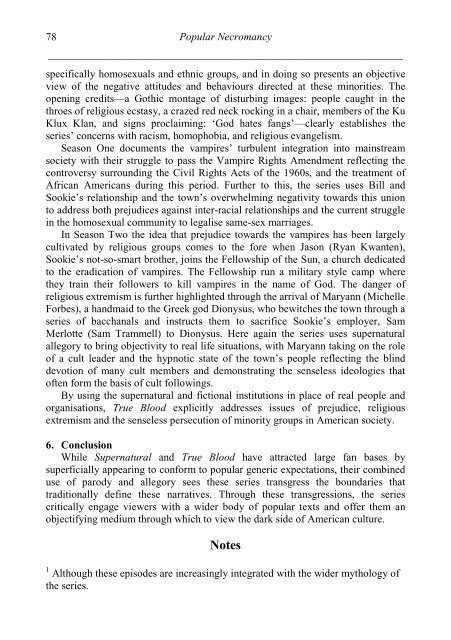Magic and the Supernatural - Lancaster University
Magic and the Supernatural - Lancaster University
Magic and the Supernatural - Lancaster University
You also want an ePaper? Increase the reach of your titles
YUMPU automatically turns print PDFs into web optimized ePapers that Google loves.
78<br />
Popular Necromancy<br />
__________________________________________________________________<br />
specifically homosexuals <strong>and</strong> ethnic groups, <strong>and</strong> in doing so presents an objective<br />
view of <strong>the</strong> negative attitudes <strong>and</strong> behaviours directed at <strong>the</strong>se minorities. The<br />
opening credits—a Gothic montage of disturbing images: people caught in <strong>the</strong><br />
throes of religious ecstasy, a crazed red neck rocking in a chair, members of <strong>the</strong> Ku<br />
Klux Klan, <strong>and</strong> signs proclaiming: ‘God hates fangs’—clearly establishes <strong>the</strong><br />
series’ concerns with racism, homophobia, <strong>and</strong> religious evangelism.<br />
Season One documents <strong>the</strong> vampires’ turbulent integration into mainstream<br />
society with <strong>the</strong>ir struggle to pass <strong>the</strong> Vampire Rights Amendment reflecting <strong>the</strong><br />
controversy surrounding <strong>the</strong> Civil Rights Acts of <strong>the</strong> 1960s, <strong>and</strong> <strong>the</strong> treatment of<br />
African Americans during this period. Fur<strong>the</strong>r to this, <strong>the</strong> series uses Bill <strong>and</strong><br />
Sookie’s relationship <strong>and</strong> <strong>the</strong> town’s overwhelming negativity towards this union<br />
to address both prejudices against inter-racial relationships <strong>and</strong> <strong>the</strong> current struggle<br />
in <strong>the</strong> homosexual community to legalise same-sex marriages.<br />
In Season Two <strong>the</strong> idea that prejudice towards <strong>the</strong> vampires has been largely<br />
cultivated by religious groups comes to <strong>the</strong> fore when Jason (Ryan Kwanten),<br />
Sookie’s not-so-smart bro<strong>the</strong>r, joins <strong>the</strong> Fellowship of <strong>the</strong> Sun, a church dedicated<br />
to <strong>the</strong> eradication of vampires. The Fellowship run a military style camp where<br />
<strong>the</strong>y train <strong>the</strong>ir followers to kill vampires in <strong>the</strong> name of God. The danger of<br />
religious extremism is fur<strong>the</strong>r highlighted through <strong>the</strong> arrival of Maryann (Michelle<br />
Forbes), a h<strong>and</strong>maid to <strong>the</strong> Greek god Dionysus, who bewitches <strong>the</strong> town through a<br />
series of bacchanals <strong>and</strong> instructs <strong>the</strong>m to sacrifice Sookie’s employer, Sam<br />
Merlotte (Sam Trammell) to Dionysus. Here again <strong>the</strong> series uses supernatural<br />
allegory to bring objectivity to real life situations, with Maryann taking on <strong>the</strong> role<br />
of a cult leader <strong>and</strong> <strong>the</strong> hypnotic state of <strong>the</strong> town’s people reflecting <strong>the</strong> blind<br />
devotion of many cult members <strong>and</strong> demonstrating <strong>the</strong> senseless ideologies that<br />
often form <strong>the</strong> basis of cult followings.<br />
By using <strong>the</strong> supernatural <strong>and</strong> fictional institutions in place of real people <strong>and</strong><br />
organisations, True Blood explicitly addresses issues of prejudice, religious<br />
extremism <strong>and</strong> <strong>the</strong> senseless persecution of minority groups in American society.<br />
6. Conclusion<br />
While <strong>Supernatural</strong> <strong>and</strong> True Blood have attracted large fan bases by<br />
superficially appearing to conform to popular generic expectations, <strong>the</strong>ir combined<br />
use of parody <strong>and</strong> allegory sees <strong>the</strong>se series transgress <strong>the</strong> boundaries that<br />
traditionally define <strong>the</strong>se narratives. Through <strong>the</strong>se transgressions, <strong>the</strong> series<br />
critically engage viewers with a wider body of popular texts <strong>and</strong> offer <strong>the</strong>m an<br />
objectifying medium through which to view <strong>the</strong> dark side of American culture.<br />
Notes<br />
1<br />
Although <strong>the</strong>se episodes are increasingly integrated with <strong>the</strong> wider mythology of<br />
<strong>the</strong> series.

















